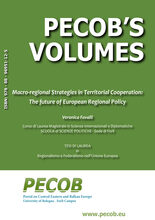and Balkan Europe
by IECOB & AIS Università di Bologna

This area collects and offers a wide range of scientific contributions and provides scholars, researchers and specialists with publishing opportunities for their research results
Macro-regional Strategies in Territorial Cooperation: The future of European Regional Policy
by: Veronica Favalli
pp: 117
ISBN: 978-88-96951-12-5

Abstract
This thesis aims to contribute to the current debate on the new concept of EU macro-regional strategies. The objective of this work is to investigate the potentialities of these political strategies, to analyse the importance of the pre-existing structures they emerged from, to highlight the peculiarities that distinguish them from other forms of territorial cooperation so far known within the framework of the EU Regional Policy and to examine all the critical aspects. What are the concrete objectives of the launching of macro-regional strategies? Can the macro-regional approach veritably contribute to enhance the effectiveness of the EU Cohesion Policy? And finally, do these new instruments after all bring added value to the European Union as a whole? The present research tries to find an answer to all these questions, paying special attention to the role that sub-national entities play in the early stages of the drafting and implementation of macro-regional strategies. Ample space will be given to the process leading to the emergence of the Adriatic and Ionian macro-region, the conditions of departure of this strategy, its promoters and the current debates related to this topic.
Preface
My personal interest in the macro-regional phenomenon was born during my first internship in Brussels (Belgium) in 2012, when the Delegation to the EU of Confcommercio – Imprese per l’Italia, the Italian General Confederation of trade, tourism, services and small and medium enterprises (SMEs), asked me to research on the economic opportunities offered to Italian enterprises in the context of EU transnational cooperation programmes with South East Europe. This dissertation is based on the analysis of scientific literature, EU official documents, interviews and on specific surveys conducted during my traineeship at the European Parliament from September 2013 to March 2014, when I followed the meetings of the Committee on Regional Development (REGI) and attended conferences and debates at the Committee of the Regions (CoR). Other surveys and fieldworks on the issue have been conducted within the framework of my collaboration with the IECOB research team on EUSAIR. The participation to the online public stakeholder consultation for EUSAIR and to the final stakeholders consultation conference in Athens in February 2014 helped me to perceive how a macro-region is built in practice, outside and beyond the generally used “political statements”. Thus, the decision to focus the case-study on the institutional building of the Adriatic and Ionian macro-regional strategy derives from my personal interest in this project, the fact that it involves my country of origin (Italy) and my belief that it is an innovative project that, if well implemented, will bring countless advantages for the European integration. Nowadays, I work as policy adviser for Confcommercio - Imprese per l’Italia in Brussels, appointed to follow the dossiers concerning the EU Cohesion Policy (European Structural and Investment Funds, Territorial Cooperation and Macro-regions, EU Urban Agenda), EU direct funding programmes and lobby for the interests of the world of SMEs.
Table of contents
List of Tables and Figures
Acronyms
Introduction
Chapter 1. Regions in Europe
1.1 Essential concepts: region, regionalization and regionalism
1.2 The development of a European Union’s Regional Policy
1.3 Toward a Europe with the regions?
1.4 Multi-level governance in the EU policy-making
Chapter 2. Compendium on European Territorial Cooperation
2.1 Three types of territorial cooperation: cross-border, transnational and interregional
2.2 Historical lessons on the evolution of cross-border structures
2.2.1 Euroregions, Working Communities and other Cooperative Organisms
2.3 The realization of a European Union’s Policy for Territorial Cooperation
2.3.1 The European Grouping of Territorial Cooperation
Chapter 3. The EU Macro-regional strategy: Genesis of a new policy tool
3.1 The emergence of the concept of macro-region within the framework of the EU Regional Policy
3.2 Macro-regional strategies: definition and characteristics
3.2.1 The Institutional building of a macro-region
3.2.2 Distinctions between macro-regions and other instruments for territorial cooperation
3.3 An overview of existing EU macro-regional strategies
3.4 Macro-regional governance and the role of regional and local authorities
3.5 Financial perspectives for macro-regional strategie
Chapter 4. Defining future macro-regional strategies: The Adriatic and Ionian region
4.1 Distinctive features of the Adriatic and Ionian region
4.1.1 History of territorial cooperation in the Adriatic and Ionian region
4.2 The Adriatic and Ionian macro-regional strategy
4.3 Financial perspectives for the Adriatic and Ionian Strategy
4.4 State of play and future prospects of the Adriatic and Ionian macro-region
Chapter 5. An evaluation on macro-regional strategies: challenges and opportunities
5.1 An assessment on already implemented macro-regional strategies
5.2 Main challenges to overcome and potential fields of tension
5.3 Lessons learned: conditions to ensure the success of a macro-regional strategy
Conclusion
Annex
Bibliography


 Download the full Volume!
Download the full Volume!





